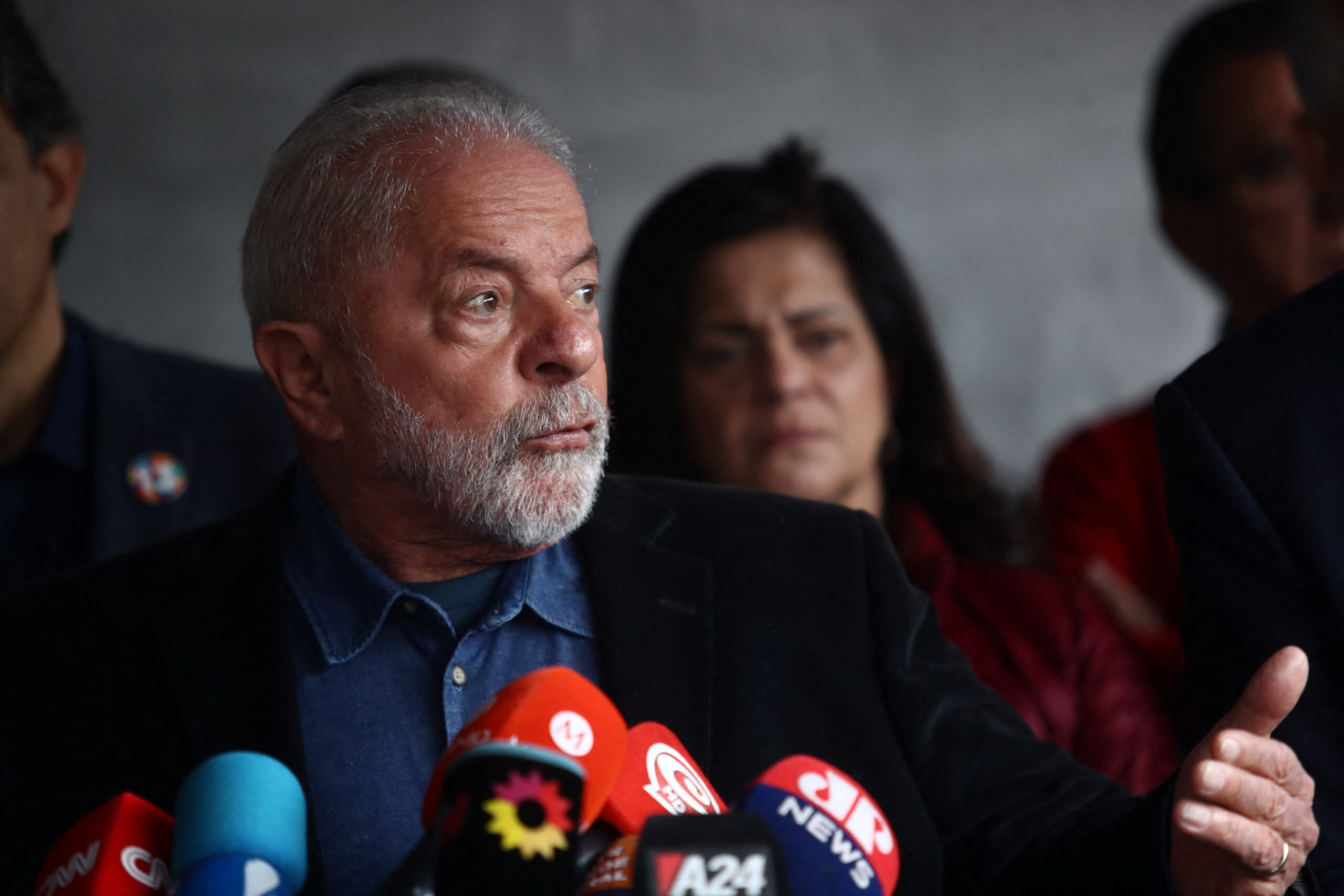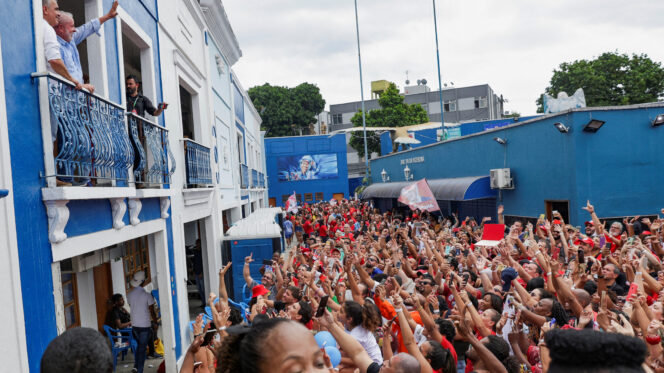Brazil Election: Lula May Be in the Lead, But He’s Up Against a Powerful Ideology
To defeat Bolsonaro, Lula will need charisma and substance. Luckily, he has both.
by Joana Ramiro
7 October 2022

Following the 1964 military coup, Brazilian musician Chico Buarque wrote a song that begins: “In spite of you, tomorrow will be another day”. It became an anthem of the resistance movement and popular beyond it, loved even by those unaware of its pro-democracy message. In it, Buarque, one of Brazil’s cultural heroes, challenges the regime to survive poetry and flowering gardens, the breaking day and people in love. It is a reminder that while for over two decades there were Brazilians who supported an administration that persecuted, tortured and murdered, many others openly defended justice, equality and freedom.
As Brazil gears up for the second round of its presidential election on 30 October, Buarque’s song is on many people’s minds. On the ballot will be Jair Bolsonaro, an outspoken fan of the dictatorship, and Luís Inácio Lula da Silva, whose campaign to rescue democracy has garnered support from across the political spectrum. While Lula’s failure to win outright in the first round on Sunday 2 October was disappointing to those who hoped to kick Bolsonaro out of the presidency as swiftly as possible, the odds are nonetheless extremely good for the left candidate.
The vote change between 2018 and last Sunday was impressive. Over 600 electoral wards switched from Bolsonaro to Lula, while the opposite happened in merely 24. Lula might have been only five points ahead of Bolsonaro, but those five points are equivalent to six million votes. In fact, with a total of 57 million ballots cast in his name, Lula has become the most-voted for presidential candidate in Brazilian history.
On Wednesday, leader of the centre-right MDB party Simone Tebet, who came third in Sunday’s ballot, announced she would endorse Lula in the second round. While not all of her nearly five million votes are likely to be redirected towards Lula, the announcement has significant implications. Tebet is a conservative Catholic from one of the strongholds of Brazil’s agricultural business, Mato Grosso do Sul. She represents, in sum, two of the three lobbies that rule Brazil, also known as the three Bs: bala, boi e bíblia (guns, cows and bibles).
Similarly, earlier in the week, the fourth-placed candidate, Ciro Gomes, a social democrat who has often run against Lula’s Workers’ Party (PT), said he stood by his party’s decision to endorse Lula. Gomes never mentioned Lula by name and lamented that “Brazilian democracy has funnelled to such a degree that there remain only these two unsatisfactory choices”. On social media, however, many of his supporters declared as early as Sunday night that, while they had “voted Ciro” with no regrets, they would now vote for Lula and “for democracy”. Lula supporters were quick to pick up on the trend, and responded with messages saying “welcome aboard”, “you’re amazing”, and “you’re more than welcomed, you’re needed”.
The popular vote.
In the aftermath of the first round, many have focused their frustration on the disparity between the polls and the actual results. Bolsonaro’s performance in particular – seven points ahead of most predictions – caused a stir across the Brazilian political spectrum. From the right, there were accusations that pollsters “tried to influence” the result by portraying the president as unpopular. On the left, many were confused and worried by the so-called shy vote – someone who says they will vote one way in public, but votes another in the privacy of the polling booth.
“The illusions are to blame, not reality, which has always been harsh and cruel,” historian, professor and member of PT’s national leadership Valter Pomar tells me a couple of days after the vote. Pomar, who organises on the left of the party, believes the idea that Lula could win in the first round and that all the party had to focus on was “managing victory” was both a factual and strategic error.
“We must recognise that although Lula’s victory is still the most likely, Bolsonaro’s victory is a possibility. Most elected governors, most elected senators, most elected deputies, most of the armed forces and public and private security services, a good part of the business community, an important part of Pentecostal churches, and part of the media support Bolsonaro.” Indeed, Bolsonaro’s Liberal Party (PL) currently has the largest number of seats in both the lower and upper houses of the Brazilian congress. At the start of the next legislative year, PL will have a total of 14 out of the 81 seats in the senate, and 99 out of the 513 seats in the chamber of deputies. PT, in comparison, will fare third in the senate, with eight seats, and second in the chamber with 68.
In addition to his advantage in federal government, Pomar says Bolsonaro is waging “a permanent ideological war” which continues to find traction in Brazilian society. “Bolsonaro ran a shitty government, contributed to the death of at least 700,000 people [by badly managing the pandemic], and yet 51 million voted for him in the first round,” he explains. While the president’s crass rhetoric is seen by many as merely hot air, many more still view it as right and righteous. His politics, phrases and even mannerisms tap into a false nostalgia many feel, for a time when with enough hard work and entrepreneurship they too could claim their corner of this land of plenty – or so the story goes.
Before the coup of 1964, Brazil lived between 1930 and 1951 under the administration Getúlio Vargas, which was defined by its rabid anti-communist stance. Many of the tropes seen in the Bolsonaro rhetoric, that depict leftists like Lula as the bogeyman, have been successfully lifted straight from Vargas’s playbook.
The good citizen.
Upon arrival in São Paulo, I met a Bolsonaro voter who perfectly illustrated how one of the president’s favourite concepts – that of the “good citizen” – appeals to the tightly-squeezed lower-middle class.
Alessandro is an Uber driver in his forties. He is married and has a nine-year-old daughter. Alessandro and his wife work multiple jobs to keep up with the expenses incurred by a young family in a high-inflation economy. His daughter has extracurricular English lessons and is learning karate. In addition to his Uber, Alessandro bought his wife a second-hand car for the school run and domestic errands. And, he says proudly, “no matter what, on someone’s birthday, we insist on having a little cake.” These are simple desires, but being able to afford them sets Alessandro and his family aside from many in greater São Paulo – certainly from the thousands who live in tents across the city.
His struggle coupled with his own conservative tendencies have made him vulnerable to the reactionary ideas of Bolsonarismo. As we drive through the streets of central São Paulo, Alessandro points at the many homeless people and calls them “junkies” that need to be “institutionalised”. In his view, these are people unlike him – a man who works hard to put food on the table. He thinks the police should have more powers – an idea that Bolsonaro himself has often pushed – because São Paulo is “too dangerous”. Alessandro even worries about me, begs me not to go to any “sketchy neighbourhoods”, tells me to ask him first if an area is safe to walk through. When I ask him if he feels things have gotten worse, he says yes, “in the last five years or so.” Then he realises the maths don’t add up with his political allegiances. Five years ago Michel Temer, the former leader of the MDB, was the president of Brazil. Alessandro corrects himself: “When I say five, I mean, ten, 15, 20 years ago, really. Ever since those bandits came to power.” He means Lula, of course, who won the presidential elections for the first time in October 2002.
How to win.
Winning over voters like Alessandro can’t take priority in the coming weeks, argues Pomar. “We must first consolidate the vote of those who have already voted for Lula in the first round, dispute the votes that popular sectors [poor and working class voters] gave to Bolsonaro and prioritise [fighting] for the votes of [the] more than 30 million voters who did not attend the polls.”
Endorsements from celebrities and former candidates are welcome, Pomar adds, but they shouldn’t be the focus in the lead-up to 30 October. “The breadth of the united front is measured by its popular support,” he said. “By the number of workers, poor and peripheral residents, Black people, youth [and] women that the Lula campaign can count on.”
Commenting recently on the first-round results, filmmaker Affonso Uchoa noted that “Bolsonarism will continue for decades” because of its deep roots in Brazilian society. But it is a regressive and empty ideology that has plunged millions into poverty, and this is how – Pomar says – PT must challenge it. “What will win the elections is conquering hearts, minds and votes with a project for the future,” he said. While Bolsonaro stands for “God, fatherland, family” – a motto lifted straight from the Brazilian fascist movement of the 1930s – PT must go beyond offering “rice, beans, health and education” and be unafraid of the ideological battle being waged.
In the face of Bolsonaro’s reactionary movement, Lula and his broad front are making titanic efforts to unite the Brazilian political class in defence of democracy. It’s undeniable that only Lula has the strength and momentum to stop Bolsonaro and the march of the far right in Brazil. Or, as Uchoa so beautifully put it, it’s only Lula “who can stop the process with his charisma, history and symbolism.”
Joana Ramiro is a journalist, writer, broadcaster and political commentator.


